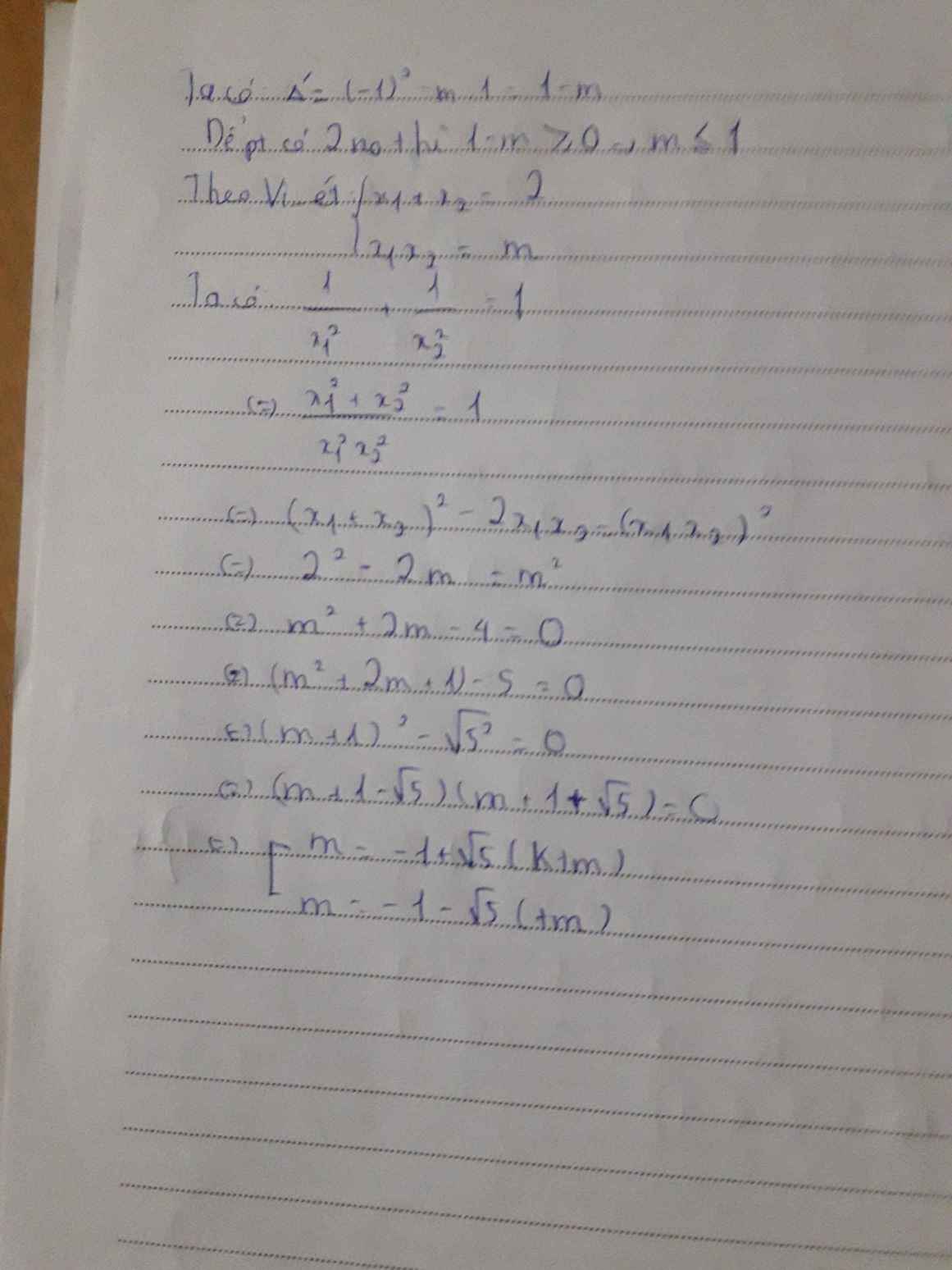Hãy nhập câu hỏi của bạn vào đây, nếu là tài khoản VIP, bạn sẽ được ưu tiên trả lời.

Xét \(\Delta=4\left(m-1\right)^2-4.\left(-3\right)=4\left(m-1\right)^2+12>0\forall m\)
=>Pt luôn có hai nghiệm pb
Theo viet:\(\left\{{}\begin{matrix}x_1+x_2=2\left(m-1\right)\\x_1.x_2=-3\ne0\forall m\end{matrix}\right.\)
Có \(\dfrac{x_1}{x_2^2}+\dfrac{x_2}{x_1^2}=m-1\)
\(\Leftrightarrow x_1^3+x_2^3=\left(m-1\right)x_1^2.x_2^2\)
\(\Leftrightarrow\left(x_1+x_2\right)^3-3x_1x_2\left(x_1+x_2\right)=\left(m-1\right).\left(-3\right)^2\)
\(\Leftrightarrow8\left(m-1\right)^3-3\left(-3\right).2\left(m-1\right)=9\left(m-1\right)\)
\(\Leftrightarrow8\left(m-1\right)^3+9\left(m-1\right)=0\)
\(\Leftrightarrow\left(m-1\right)\left[8\left(m-1\right)^2+9\right]=0\)
\(\Leftrightarrow m=1\)(do \(8\left(m-1\right)^2+9>0\) với mọi m)
Vậy m=1
Vì \(ac< 0\) \(\Rightarrow\) Phương trình luôn có 2 nghiệm phân biệt
Theo Vi-ét, ta có: \(\left\{{}\begin{matrix}x_1+x_2=2m-2\\x_1x_2=-3\end{matrix}\right.\)
Mặt khác: \(\dfrac{x_1}{x_2^2}+\dfrac{x_2}{x_1^2}=m-1\) \(\Rightarrow\dfrac{\left(x_1+x_2\right)\left(x_1^2+x_2^2-x_1x_2\right)}{x_1^2x_2^2}=m-1\)
\(\Leftrightarrow\dfrac{\left(x_1+x_2\right)\left[\left(x_1+x_2\right)^2-3x_1x_2\right]}{x_1^2x_2^2}=m-1\)
\(\Rightarrow\dfrac{\left(2m-2\right)\left(4m^2-8m+13\right)}{9}=m-1\)
\(\Leftrightarrow...\)

Phương trình có nghiệm \(\Leftrightarrow\Delta'\ge0\Leftrightarrow1-m\ge0\Leftrightarrow m\le1\)
Theo hệ thức Vi-ét: \(\left\{{}\begin{matrix}x_1+x_2=2\\x_1x_2=m\end{matrix}\right.\) (1)
Ta có: \(\dfrac{1}{x^2}+\dfrac{1}{x^2}=1\Leftrightarrow\dfrac{x^2_1+x^2_2}{x^2_1x^2_2}=1\Leftrightarrow\dfrac{\left(x_1+x_2\right)^2-2x_1x_2}{\left(x_1x_2\right)^2}=1\) (2)
Từ (1) và (2) \(\Rightarrow4-2m=m^2\Leftrightarrow m^2+2m-4=0\)
\(\Delta'=1+4=5\Rightarrow\sqrt{\Delta'}=\sqrt{5}\Rightarrow\left[{}\begin{matrix}m=-1+\sqrt{5}\left(\text{loại}\right)\\m=-1-\sqrt{5}\left(\text{nhận}\right)\end{matrix}\right.\)
Vậy \(m=-1-\sqrt{5}\)

\(pt:x^2-4x+m+1=0\)
\(\Delta=b^2-4ac=\left(-4\right)^2-4.1.\left(m+1\right)\)\(=16-4m-4=12-4m\)
Phương trình có hai nghiệm x1 ,x2 :
\(\Leftrightarrow\Delta\ge0\Leftrightarrow12-4m\ge0\Leftrightarrow m\le3\)(1)
Theo hệ thức Viet ta có :
\(\hept{\begin{cases}x_1+x_2=4\\x_1.x_2=m+1\end{cases}}\)
\(x_1^2+x_2^2=12\)
\(\Leftrightarrow\left(x_1+x_2\right)^2-2x_1.x_2=12\)
\(\Leftrightarrow16-2m-2=12\Leftrightarrow14-2m=12\Leftrightarrow2m=2\Leftrightarrow m=1\)( TMĐK (1))
Vậy m = 1

Ta có: \(\Delta=4m^2+4m-11\)
Để phương trình có 2 nghiệm phân biệt \(\Leftrightarrow4m^2+4m-11>0\)
Theo Vi-ét, ta có: \(\left\{{}\begin{matrix}x_1+x_2=2m+3\\x_1x_2=2m+5\end{matrix}\right.\)
Để phương trình có 2 nghiệm dương phân biệt
\(\Leftrightarrow\left\{{}\begin{matrix}4m^2+4m-11>0\\2m+3>0\\2m+5>0\end{matrix}\right.\) \(\Leftrightarrow\left\{{}\begin{matrix}\left[{}\begin{matrix}m< \dfrac{-1-2\sqrt{3}}{2}\\m>\dfrac{-1+2\sqrt{3}}{2}\end{matrix}\right.\\m>-\dfrac{3}{2}\\m>-\dfrac{5}{2}\end{matrix}\right.\) \(\Leftrightarrow m>\dfrac{-1+2\sqrt{3}}{2}\)
Mặt khác: \(\dfrac{1}{\sqrt{x_1}}+\dfrac{1}{\sqrt{x_2}}=\dfrac{4}{3}\)
\(\Rightarrow\dfrac{x_1+x_2+2\sqrt{x_1x_2}}{x_1x_2}=\dfrac{16}{9}\) \(\Rightarrow\dfrac{2m+3+2\sqrt{2m+5}}{2m+5}=\dfrac{16}{9}\)
\(\Rightarrow18m+27+18\sqrt{2m+5}=32m+80\)
\(\Leftrightarrow14m-53=18\sqrt{2m+5}\)
\(\Rightarrow\) ...

Ta có: \(\Delta=\left[-2\left(m-1\right)\right]^2-4\cdot1\cdot\left(m+1\right)\)
\(=\left(-2m+2\right)^2-4\left(m+1\right)\)
\(=4m^2-8m+4-4m-4\)
\(=4m^2-12m\)
Để phương trình có nghiệm thì \(\text{Δ}\ge0\)
\(\Leftrightarrow4m^2-12m\ge0\)
\(\Leftrightarrow4m\left(m-3\right)\ge0\)
\(\Leftrightarrow m\left(m-3\right)\ge0\)
\(\Leftrightarrow\left[{}\begin{matrix}m\ge3\\m\le0\end{matrix}\right.\)
Khi \(\left[{}\begin{matrix}m\ge3\\m\le0\end{matrix}\right.\), Áp dụng hệ thức Vi-et, ta có:
\(\left\{{}\begin{matrix}x_1+x_2=2\left(m-1\right)=2m-2\\x_1\cdot x_2=m+1\end{matrix}\right.\)
Ta có: \(\dfrac{x_1}{x_2}+\dfrac{x_2}{x_1}=4\)
\(\Leftrightarrow\dfrac{x_1^2+x_2^2}{x_1\cdot x_2}=4\)
\(\Leftrightarrow\dfrac{\left(x_1+x_2\right)^2-2x_1x_2}{x_1x_2}=4\)
\(\Leftrightarrow\dfrac{\left(2m-2\right)^2-2\cdot\left(m+1\right)}{m+1}=4\)
\(\Leftrightarrow4m^2-8m+4-2m-2=4\left(m+1\right)\)
\(\Leftrightarrow4m^2-10m+2-4m-4=0\)
\(\Leftrightarrow4m^2-14m-2=0\)
Đến đây bạn tự làm nhé, chỉ cần tìm m và đối chiều với điều kiện thôi
Pt có 2 nghiệm
\(\to \Delta=[-2(m-1)]^2-4.1.(m+1)=4m^2-8m+4-4m-4=4m^2-12m\ge 0\)
\(\leftrightarrow m^2-3m\ge 0\)
\(\leftrightarrow m(m-3)\ge 0\)
\(\leftrightarrow \begin{cases}m\ge 0\\m-3\ge 0\end{cases}\quad or\quad \begin{cases}m\le 0\\m-3\le 0\end{cases}\)
\(\leftrightarrow m\ge 3\quad or\quad m\le 0\)
Theo Viét
\(\begin{cases}x_1+x_2=2(m-1)\\x_1x_2=m+1\end{cases}\)
\(\dfrac{x_1}{x_2}+\dfrac{x_2}{x_1}=4\)
\(\leftrightarrow \dfrac{x_1^2+x_2^2}{x_1x_2}=4\)
\(\leftrightarrow \dfrac{(x_1+x_2)^2-2x_1x_2}{x_1x_2}=4\)
\(\leftrightarrow \dfrac{[2(m-1)]^2-2.(m+1)}{m+1}=4\)
\(\leftrightarrow 4m^2-8m+4-2m-2=4(m+1)\)
\(\leftrightarrow 4m^2-10m+2-4m-4=0\)
\(\leftrightarrow 4m^2-14m-2=0\)
\(\leftrightarrow 2m^2-7m-1=0 (*)\)
\(\Delta_{*}=(-7)^2-4.2.(-1)=49+8=57>0\)
\(\to\) Pt (*) có 2 nghiệm phân biệt
\(m_1=\dfrac{7+\sqrt{57}}{2}(TM)\)
\(m_2=\dfrac{7-\sqrt{57}}{2}(TM)\)
Vậy \(m=\dfrac{7\pm \sqrt{57}}{2}\) thỏa mãn hệ thức

PT có 2 nghiệm `<=> \Delta' >0 <=> 2^2-1.(m+1)>0<=> m<3`
Viet: `x_1+x_2=-4`
`x_1 x_2=m+1`
`(x_1)/(x_2)+(x_2)/(x_1)=10/3`
`<=> (x_1^2+x_2^2)/(x_1x_2)=10/3`
`<=> ((x_1+x_2)^2-2x_1x_2)/(x_1x_2)=10/3`
`<=> (4^2-2(m+1))/(m+1)=10/3`
`<=> m=2` (TM)
Vậy `m=2`.